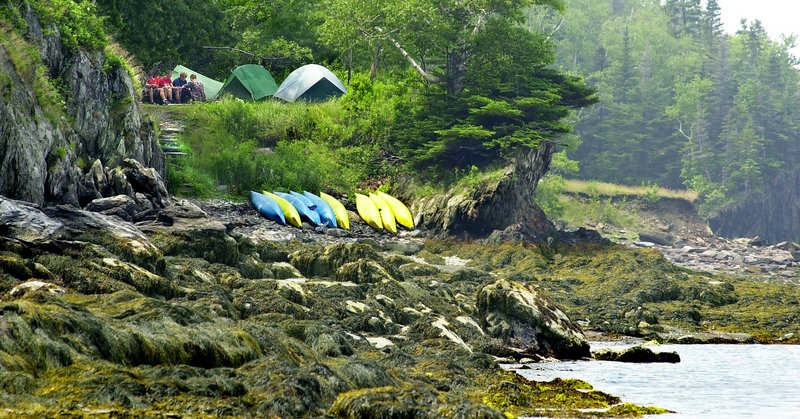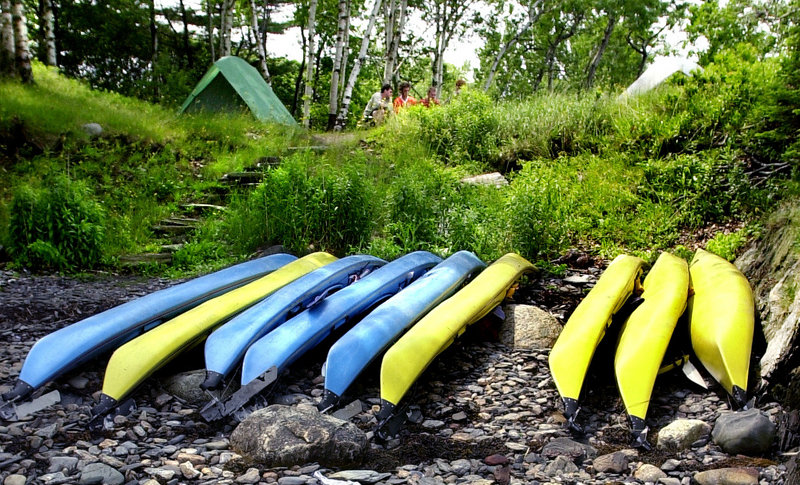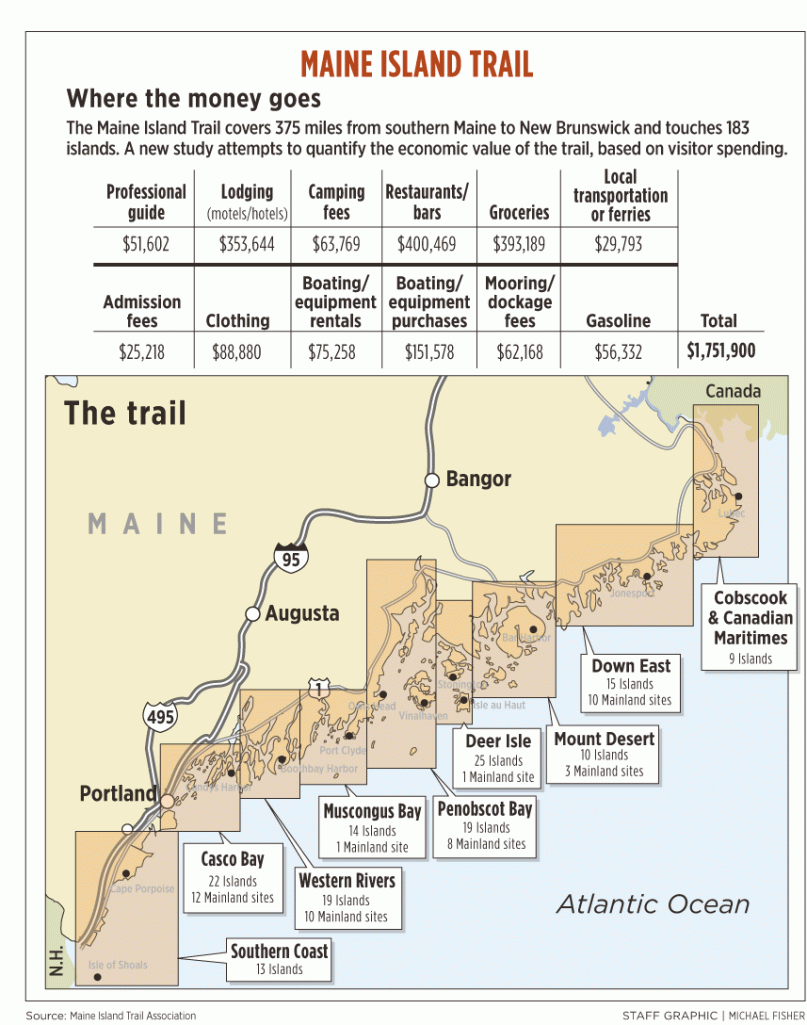Bill Baker got a call recently from a California couple who want to get married this summer on a Maine island. Baker, owner of Old Quarry Ocean Adventures in Stonington, is suggesting a few nearby destinations. They include state-owned Hell’s Half Acre and Steve’s Island, and Green Island, owned by the Maine Coast Heritage Trust.
All are on the Maine Island Trail, a 375-mile, recreational water route that’s gaining increasing national recognition among paddlers and boaters — and the occasional wedding party. That awareness, outfitters and guides such as Baker have learned, also has an economic component.
“It’s a huge attraction and a big part of my business,” he said. “If the Maine Island Trail wasn’t there, and those islands weren’t open to the public, it would be very difficult to find destinations.”
Baker’s experience is now being reflected in a first-ever economic benefits study of the Maine Island Trail.
The study was done for the Maine Island Trail Association, the Portland-based, nonprofit group that acts as a steward for the chain of wild, undeveloped isles. It found that the coastal trail generated $1.75 million a year in spending by visitors over the past nine boating seasons, including $553,000 annually from travelers who otherwise wouldn’t have spent money in Maine.
Out-of-state visitors spent the most on average, $684 for day trips and $1,177 for overnights.
The money went primarily to lodging, restaurants, groceries and boat equipment, but also to camping, mooring fees, rentals and guide services. The greatest share was spent in the Deer Isle region, where Baker is based, followed by Casco Bay. As a group, sailors spent the most, followed by kayakers and motorboaters.
The study also estimated that the trail generates $54,000 a year in state and local tax revenue. That finding was notable: The Maine Bureau of Parks and Lands gives the association $50,000 a year to help manage the 47 state-owned islands on the trail. That management contract ends in 2014, and the association wanted to quantify the value of the deal.
The findings are being made public during a time of tight budgets and political change in Maine, but also as nature-based, sustainable tourism is being promoted as a form of economic development.
The study was done by two graduate students at the Harvard Kennedy School, Jonathan Glassman and Vilas Rao. In the summary, they characterize their estimates as conservative.
The water trail, obviously, has no gates and offers unlimited access points, so there’s no way to count all the visitors and gather their specific use information.
The students benefited from a previous trail-user census done in the Deer Isle region, and a University of Maine survey that included visitor interviews and a review of logbooks placed each season on key islands. These logbooks received 13,416 entries from 85 islands.
The students conducted an online survey last year to capture spending patterns and other travel details. They received 785 responses.
The study found that most visitors are from New England, with 45 percent from Maine and Massachusetts. Kayakers make up half of the total. Half of all users are day-trippers; for campers, the average trip lasts two or three days.
The Maine Island Trail is considered the nation’s first recreational water trail. It was conceived by David Getchell Sr. in 1987, following an inventory of 40 state-owned islands. The trail now touches 183 islands from the southern Maine coast to New Brunswick, as well as several mainland locations.
The trail is widely known in paddling and boating communities, but in recent years, it has been gaining more national media attention. It was recognized two years ago, for instance, as one of the 50 best American adventures by National Geographic Adventure Magazine.
Growing awareness has led to slow but steady growth in trail use, according to Doug Welch, the association’s executive director. The group relies heavily on voluntary agreements with private landowners and has worked over the years to balance use of the most popular islands with its overall mission — responsible, sustainable recreation on Maine’s coastal islands.
“The mission of MITA isn’t to maximize recreation,” Welch said.
But it’s also possible, the study noted, for the association to reference the economic impact findings to help secure financial support for its management goals. The group has six employees and a $513,943 budget this year. It collects the largest share of revenues from private donations, and relies heavily on volunteers.
Last month, the association’s finances drew public attention when it filed a lawsuit against its former business manager, claiming she had embezzled $117,000 over more than four years. Despite the loss, the group says it has enough money to meet its financial obligations.
The state’s $50,000 contribution goes to general maintenance and funds a summer caretaker on Casco Bay’s Jewell Island, the trail’s most popular stop. The study shows that the money is a good investment for the state, according to Rex Turner, an outdoor recreation planner in the parks and lands bureau.
“If MITA disappeared, we’d be in a tough spot,” Turner said. “We’d have a hard time filling that gap.”
Occasional studies have assessed the economic benefits of state parks and snowmobiling in Maine, for instance, but this report appears to be the first to focus so intensely on a single trail, Turner said.
The findings are similar to those of a 2006 study of the Northern Forest Canoe Trail, a 740-mile route from New York through Maine. That study, which included surveys in the Rangeley Lakes and Allagash regions, tallied $12.6 million of economic impact.
But while the economic benefits of water trails are welcome, they also are limited. Like the Northern Forest Canoe Trail, the Maine Island Trail is diffuse and remote, and not intended for mass tourism.
“It’s not Disneyland,” Welch said. “This is a wild, ocean-based experience.”
Staff Writer Tux Turkel can be contacted at 791-6462 or
tturkel@pressherald.com
Send questions/comments to the editors.






Success. Please wait for the page to reload. If the page does not reload within 5 seconds, please refresh the page.
Enter your email and password to access comments.
Hi, to comment on stories you must . This profile is in addition to your subscription and website login.
Already have a commenting profile? .
Invalid username/password.
Please check your email to confirm and complete your registration.
Only subscribers are eligible to post comments. Please subscribe or login first for digital access. Here’s why.
Use the form below to reset your password. When you've submitted your account email, we will send an email with a reset code.